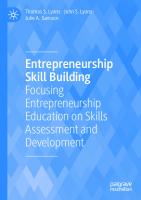Entrepreneurship Development [1 ed.] 9789350431351, 9789350245750
This book is designed as a text book for those students who opt for the subject Entrepreneurship Development and also as
674 27 15MB
English Pages 138 Year 2009
Recommend Papers
![Entrepreneurship Development [1 ed.]
9789350431351, 9789350245750](https://ebin.pub/img/200x200/entrepreneurship-development-1nbsped-9789350431351-9789350245750.jpg)
- Author / Uploaded
- E. Gordon
- K. Natarajan
- Amishi Arora
File loading please wait...
Citation preview
ENTREPRENEURSHIP DEVELOPMENT
E. Gordon M.Com., M.Phil. ~oriner Professor & Head, Dept. of Commerce,
ANJA College, SIVAKASI.
Dr. K. NataraJan M.Com., M.Phil., Ph.D. Former Principal, S. V.N. College, MADURAI- 19.
Dr. Amlshl Arora Director, DMIMS, ATREY Layout, Nagpur.
Hm GJiimalaya GpublishingGJiouse MUMBAI • NEW DELHI • NAGPUR • IWlGN..ORE • HYDERABAD • CHENNAI • PIJNE LUCKNOW • AHMEDABAD. ERNAKULAM • BHUBANESWAR • INDORE
@
Authors No part of this book shall be reproduced, reprinted or translated for any purpose whatsoever without prior permission of the Authors and Publishers in writing.
FIRST EDITION
2009
ISBN : 978-93-5024-575-0 Published by
Mrs. Meena Pandey for HIMALAYA PUBLISHING HOUSE PVT. LTD., "Ramdoof', Dr. 8halerao Marg, Girgaon, Mumbal - 400 004. Phones: 2386 01 70/2386 38 63, Fax: 022-2387 71 78 Email: [email protected] Website: www.hlmpub.com
Branch Offlc.. : New Deihl
"Pooja Apartments", 4-8, Murari Lal Street, Ansari Road, Oarya Ganj, New Delhl-110 002. Phones: 23270392, 2327863 Fax: 011-23256286
Nagpur
Kundanlal Chandak Industrial Estate, Ghat Road, Nagpur - 440 018. Phones: 2738731,3296733 Telefax: 0712-2721215
Bangalore
No. 1611 (Old 1211), 1st Floor, Next to Hotel Highlands, Madhava Nagar, Race Course Road, Bangalore • 560 001. Phones: 22281541, 22385461, Telefax: 080-22286611
Hyderabad
No. 3-4-184, Lingampally, Besides Raghavendra Swamy Matham, Hyderabid - 500 027. Mobile: 09848130433
Chennal
No. 85/50, Bazuilah Roda, T. Nagar, Chennal· 600 017. Phones: 044-28144004128144005
Pun.
First Floor, "Laksha" Apartment, No. 527, Mehunpura, Shaniwarpeth, (Near Prabhat Theatre), Pune· 411 030. Phones: 020-244963231 24496333
Lucknow
C-43, Sector - C, Ali Gunj, Lucknow • 226 024. Phone: 0522-2339329
Ahmedabad
114, ·SHAIL", 111 Floor, Opp. Madhu Sudan House, C.G. Road, Navrang Pura, Ahmedabad - 380 009. Phone: 079-26560126, Mobile: 09327324149
Ernakulam
391104 A, Lakshmi Apartment, Karlkkamuri Cross Rd., Emakulam, Cochln - 622011. Phones: 0484-2376012,2378016, Mob: 09344199799
Bhubln •• war
5 Station Square, Bhubaneawar· 751 001. Mobile· 9861046007 E-mail:[email protected]
Indor.
Kesardeep Avenue Extension, 73, Narayan Bagh. Flat No. 302, /II1d.F1oor, Near Humpty Dumpty School, Narayan Bagh, Indore (M.P:) Mob-09301386468 HPH, Editionsl Office, Bhandup. (Nishant)
DTP by . Printed by
Geetanjall Press Pvt. Ltd., Kundanlal Chandak Industrial Estate, Ghat Road, Nagpur - 440 018.
CONTENTS I.
ENTREPRENEUR
2.
ENTREPRENEURSHIP
13 - 20
3.
FACTORS AFFECTING ENTREPRENEURIAL GROWTH
21 -27
4.
ENTREPRENEURSHIP DEVELOPMENT IN INDIA
2S - 39
5.
SMALL-SCALE INDUSTRY -AN OVERVIEW
40 - 51
6.
PROJECT IDENTIFICATION
52- 64
7.
PROJECT FORMULATION
65 - 93
S.
PROJECT APPRAISAL
9.
INSTITUTIONAL SUPPORTTO ENTREPRENEUR
107 - 119
10.
INSTITUTIONAL FINANCETO ENTREPRENEUR
120 - 133
I - 12
94 - 106
"This page is Intentionally Left Blank"
The 'entrepreneur' is very much related to the term 'entrepreneurship.' Both these terms are often used interchangeably. But, they are conceptually different. Hence, before dealing at length about entrepreneurship, it is better to have an exposure to the term entrepreneur.
Entrepreneur Generally speaking, entrepreneur refers to a person who establishes his own business or industrial undertaking with a view to making profit. An entrepreneur is considered to be an originator of a business venture. He takes the role of an organiser in the process of production. The word 'Entrepreneur' is derived from the French word 'Enterprendre', meaning to undertake. In fact, in the 16th century, . the Frenchmen who undertook military expeditions were referred to as 'Entrepreneurs.' Later on, in the 18th century, this term got associated with persons who started their OWr:l enterprises. Richard Cantillon, an Irishman living in France"was the first economist who introduced the term 'entrepreneur' referring to the risk-taking function of establishing a new venture.
Evolution The English classical economists recognised the importance of organising land, labour and capital in a meaningful way to get the best out of them. The organiser of these factors of production, i.e., the entrepreneur was riot recognised as a full-fledged, factor of production.
_II
Entlt'pfen(,lJIs/lIp Ouvelopment
Prior to industrial revolution, the business enterprises were led by men who had the outlook of risk-taking and making money as their interest in life.: The Industrial Revolution displaced the production units run on this basis. ,In the 17th and 18th centuries, the wealthy merchants started organising in them the functions of capitalists, managers, merchants and salesmen. From this class of merchants, some commercialised the innovations of 18th and 19111 centuries. The British Society, thlllS, newly started preparing a class of industrial leaders' capable of leading the process of development. Thus, the entrepreneur had arrived and come to stay. The economist of th~ latter half of the 1~th century 'and 20th century made the 'entrepreneur' the fourth factor. ' A large number of innovations were made commercially viable by the entrepreneurs. They turned new ideas into practice and were responsible for the success of Industrial Revolution in Britain. Today, entrepreneurs do not confine to industry but are widespread in agriculture,transport, f(nance, education, etc.
Definitions Various experts have defined the term entrepreneur in different words. Some of the definitions are as follows: According to Collins Cobulld English Language Dictionary" 1987, "An entrepreneur is a person who sets up business deals in order to make a profit." According to J.B. Say, "an entrepreneur is the economic agent who unites all means of production ...." Richard Cantillon says, "All persons engaged in economic activity are entrepreneurs." ,In the words of Quesnay, "A rich farmer is an entrepreneur who manages and makes his business profitable by his intelligence and wealth." J.A. SchUmpeter is of the view that, "A person who introduces 'innovative changes is an entrepreneur and he is an integral part of economic growth." ' According to Webster, "Entrepreneur is one who assumes risk and ' management of business." In the words of,Walker, "True entrepreneur is one who is' endowed with more than average capacities in the risk of organiSing and coordinating various factors of ~roduction." Peter .Drucker says, "Entrepreneur is one who always searches for change,responds to it and exploits it as an. opportunity. Innovation is a specific tool of entrepreneurs, the means by whic~ they exploit change 'as an opportunity for different business or service."
Enterpreneur
11_
Dewing has rightly put it as follows: "The function of entrepreneur is that promotes ideas into business."
on~
Thus, an entrepreneur is always action-oriented. He has the ability to visualise the necessary steps involved from idea generation to its actualisation. He is both a thinker and doer; planner and worker. He accepts risk and manages it. All the above definitions portray an entrepreneur as an initiator of action, stimulator of social economic change and a harnesser of resources.
Characteristics of an Entrepreneur Anybody can become an entrepreneur provided he has got a certain set of behavioural traits and mental aptitude. His success depends more on hard work than good luck. He must be a DOER and not a DREAMER. The success of an entrepreneur depends largely on his intelligence, imagination, capacity to innovate and his ability to turn visions into realities. It is not necessary that he should possess a professor's intelligence, a prophet's foreseeing capacity, a salesman's persuasiveness, a banker's financial talent, a politician's power, a filmstar's magnetic personality and so on. The only capacity, very essential to become an entrepreneur is the willingness to work hard. There are certain characteristic features which make an entrepreneur successful in his venture. They have been briefly discussed hereunder: 1. Hard Work: A successful entrepreneur is one who is willing to work hard from the very beginning of his enterprise. An entrepreneur with his tenacity and hard work and pervasive perseverance can revive his business even from on the verge of collapse. 2. Busl!"ess Acumen and Sincerity: Business Acumen stands for shrewdness and ability. Again, the success of an enterprise depends upon the sincerity of the people behind the enterprise. If a person is sincere about his venture, he will move heaven and earth to make it a success. 3. Prudence: A successful entrepreneur must be prudent' in all his dealings. He should have the ability to work out the details of the venture from all angles, assess the favourable factors and pitfalls and take suitable measures to overcome the pitfalls. 4. Achievement Motivation: The achievement motivation is the most important characteristic of an entrepreneur since all other characteristics emanate from this motivation. He must have a strong desire to achieve high goals in business. In fact, this achievement motivation helps him to surmount the obstacles, suppress anxieties, repair misfortunes and devise plans for success. 5. Self-reliance and Independence: A successful entrepreneur wants to follow his own routine policies and procedures and he does not like to be guided by others. He is found to be self, reliant by acting as his own master and making him responsible for all his decisions. He doesn't like to work for others.
_II
Entrepreneurship Development
6. Highly Optimistic: Successful entrepreneur is always optimistic about his future and he is never disturbed by the present problems. He always expects a favourable situation for his business and hence he is able to run his business successfully in the midst of temporary hurdles. He does not allow the past to obsess him. 7. Keen Foresight: An entrepreneur must have keen foresight to predict the future business environment. He has the capacity to visualise the likely changes to take place in the market, customer's attitude, technologi



![Entrepreneurship: Venture Initiation, Management, and Development [2 ed.]
9780765631138](https://ebin.pub/img/200x200/entrepreneurship-venture-initiation-management-and-development-2nbsped-9780765631138.jpg)





